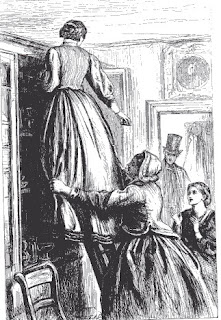My New Year trip to the borders has become something of a tradition, indeed a host of traditions including this one; from the moment I buy my train ticket each year and know I’m actually going I start planning which books I’ll take. I try for a good spread of books to cover any likely mood and to have at least one more (but no more than two more) than I can read...
This year I managed to read Scott’s ‘The Bride of Lammermoor’, and Muriel Spark’s ‘Symposium’ (in-between my confusion over what to do with ‘The Small House at Allington’ – it was a packed holiday). The Muriel Spark was one I’ve been looking forward to for a while and which I thought might make for a welcome change of pace between all the 19th century doorstops I’ve been hauling around with me.
So far I’ve not read a Spark I didn’t like but ‘Symposium’ is defiantly the oddest offering yet from a writer who doesn’t shy away from odd. It’s billed on the back blurb as being the story of a dinner party where connections are made between the characters and tensions build. There is also talk of boiling emotions and ugly motives all of which is quite true but only gave me the sketchiest indication of what was actually in the book (it’s either a really good blurb or a really not good one I can’t quite decide).
For me, and this is straight off the back of ‘The Bride of Lammermoor’ with its attendant chorus of hags and prophecy, there was a good bit of the occult about ‘Symposium’. The unifying theme is a dinner party and it’s a great device for introducing characters, telling a bit of story and then quickly moving on. The story I picked up on was that of young bride Margaret Damien (nee Murchie) an almost unnaturally self possessed young woman who’s just too good to be true. It’s not true and dark things keep happening around her in what I think of as a particularly Scottish way. What I read this time was a murder mystery but the really brilliant thing about this book is that next time I read it when doubtless I’ll have a different set of pre-occupations is that it will almost certainly be another strand that catches my attention and I’ll find myself reading a book about love, or obsession, or family, or friendship...
Surely not many writers could pull off a trick like this in less than a 150 pages – Spark makes it look effortless.
 Every week is Virago week with me (number of virago modern classics bought in the last 7 days – 8, so it’s been a good week, and you can probably guess it’s been pay day as well) but a semi official ‘Virago reading week’ (thanks to Rachel and Carolyn) has been interesting. It’s fascinating to see how many of us there are who share a love for this particular imprint, and how general the feeling of ‘discovery’ is (nobody ‘discovers’ penguin). Publishing and especially the publishing of ‘lost’ classics has changed almost beyond recognition in the last decade and a half, but when I first found Virago there was nothing else quite like it – nobody else giving back a voice to the generations of women who earned a living through writing but were lost to the canon.
Every week is Virago week with me (number of virago modern classics bought in the last 7 days – 8, so it’s been a good week, and you can probably guess it’s been pay day as well) but a semi official ‘Virago reading week’ (thanks to Rachel and Carolyn) has been interesting. It’s fascinating to see how many of us there are who share a love for this particular imprint, and how general the feeling of ‘discovery’ is (nobody ‘discovers’ penguin). Publishing and especially the publishing of ‘lost’ classics has changed almost beyond recognition in the last decade and a half, but when I first found Virago there was nothing else quite like it – nobody else giving back a voice to the generations of women who earned a living through writing but were lost to the canon. No longer an independent publishing house and the iconic green jackets a thing of the past (but oh so collectable) I still think Virago are one of the most exciting imprints around. The list might be smaller than in its heyday but arguably the overall quality is a shade higher – long may the good work continue.

















